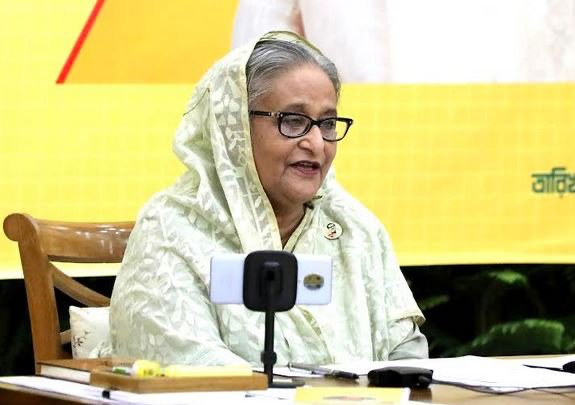Prime Minister Sheikh Hasina today said her government is bound to carry out load shedding and limit electricity production as the fuel prices are continuously increasing globally due to Russia-Ukraine war, urging countrymen to comply with the situation.
"We have reached electricity to every house. But, now, we are compelled to execute load shedding and limit electricity generation as we couldn't give (any more) subsidy in the power," she said.
The prime minister said this while inaugurating the country's first university campus-based IT business incubator at the Chittagong University of Engineering and Technology (CUET) named Sheikh Kamal IT Business Incubator (SKIBI).
She virtually joined the programme held at CUET campus from her official Ganabhaban residence here while she also opened Sheikh Jamal Dormitory and Rosy Jamal Dormitory.
The prime minister said she asked authorities concerned to prepare a routine to accomplish area-wise specific time based load shedding across the country, urging the countrymen to save power in line with their best ability.
"Prepare a routine on how long load shedding will be executed in which area so the people can prepare themselves for that and their suffering can decrease this way," she said.
She hoped that the countrymen would help the government in this regard realising the fact that the prices of everything including food, transportation, fertiliser, oil, LNG and diesel increased globally for Russia-Ukraine war and the situation is worsening as America-Europe imposed sanctions on Russia.
She also said the situation impacted on the whole world even on Bangladesh. But, the country is forwarding facing all these problems, she added.
The prime minister noted that her government is currently giving a total subsidy of Tk 28000 crore to the power sector.
She said, "We have to provide a subsidy of Tk 25000 crore for LNG import to meet the demand of gas for making the power plants operational."
She also said they have to give a subsidy of TK 84,000cr every year and allocation for the subsidy have also been made in the current budget, adding, "If we don't reduce the subsidy, then, from where the government will get the money."
Besides the subsidy, she said her government has given stimulus packages for rolling out the country's economy along with giving one crore ration cards to get essentials at subsidized prices and is providing vaccines free of cost which many rich countries couldn’t do.
The prime minister also announced to include 2716 educational institutes across the country, 2051 of them under secondary and higher secondary education division while 665 others under vocational and madrashah education board, in the MPO (monthly payment order) list as she has attached topmost priority to education.
She said her government has considered investments in education as asset rather than expense as they want to prepare science and IT knowledge based generation so they can compete with the world.
An audio-video documentary on the IT business incubator was screened on the occasion.
State Minister for ICT Division Zunaid Ahmed Palak, MP, gave the address of welcome while its Senior Secretary NM Zeaul Alam moderated the function.
After inaugurating IT business incubator which is considered a move towards building a smarter Bangladesh, Sheikh Hasina said, "We will build 'Smart Bangladesh' taking one step forward by developing the already built Digital Bangladesh."
The premier said her government has been constructing 92 high-tech parks, software technology parks and IT Training and Incubator Centres across the country to prepare efficient working forces to face the challenges of the 4th industrial revolution. Of them, the construction works of nine parks have already been completed, she said.
In this connection, she recalled her visit to a cyber technology park in Malaysia along with her sister Sheikh Rehana and son Sajeeb Wazed Joy and said after the visit, Joy insisted to build such parks in Bangladesh.
The prime minister hoped that locally made digital devices would surpass the RMG sector in export in future saying that her government has been taking all necessary measures that included building infrastructure to produce digital devices in Bangladesh.
She said her government has taken initiative to build Digital Bangladesh after coming to power for the second time in 2009, adding, "We have built Digital Bangladesh in accordance with the advice of Sajeeb Wazed Joy (PM's ICT Adviser) and the name of Digital Bangladesh was also given by Joy."
The premier said they have reached broad band internet connection to village levels across the country and launched the Bangabandhu Satellite-1 to the orbit, which help her now work virtually during the Coronavirus pandemic.
In this connection, she said Khaleda Zia had refused to take submarine cable line free of cost in 1992 in excuse of being stolen out all the information while the BNP government was in power, adding, "I don't which information they had that could had been stolen."
The prime minister also said Khaleda Zia after coming to power in 2001 cancelled an order of 10,000 computers from a state-run company of the Netherlands named Tulip suspecting that Sheikh Rehana was the owner of the company as it was named after her daughter Tulip, who is now a lawmaker of the United Kingdom from Labour Party and shadow minister for finance.
And for that reason, Bangladesh had to pay Tk 32 crore as compensation as it had lost in trial of a case filed by the Netherlands government, she added.
The BNP government had no idea that Bangladesh can earn money with the development of the IT sector, she opined.
On the other side, the Awami League government has taken every possible measure for flourishing the IT sector, she said, referring to her government initiative to reduce one percent import duty on 156 equipment for manufacturing mobiles and laptops locally.
The premier said her government has been setting up 33 specialised labs equipped with IOT, robotic and cyber security at different universities across the country to prepare efficient work force to face the challenges of the fourth industrial revolution.
For which, the students can conduct research on new ideas, products and services, she said, adding that the innovative ideas would help build the country as a developed and prosperous one, free from poverty and hunger envisioned by Father of the Nation Bangabandhu Sheikh Mujibur Rahman.
After the country's independence, she said Bangabandhu had given topmost priority on education for which he made primary schools across the country nationalised, education free and compulsory up to primary level and distributed books free of cost.







-20260223062301.jpg)



-20260226080139.webp)





-20260225072312.webp)












-20260219054530.webp)
-20260224075258.webp)



-20260221022827.webp)